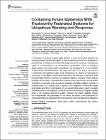| dc.contributor.author | Siljak, Harun | |
| dc.date.accessioned | 2021-08-23T15:13:59Z | |
| dc.date.available | 2021-08-23T15:13:59Z | |
| dc.date.issued | 2021 | |
| dc.date.submitted | 2021 | en |
| dc.identifier.citation | Dick Carrillo, Lam Duc Nguyen, Pedro HJ Nardelli, Evangelos Pournaras, Plinio Morita, Dem?stenes Z Rodr?guez, Merim Dzaferagic, Harun Siljak, Alexander Jung, Laurent H?bert-Dufresne, Irene Macaluso, Mehar Ullah, Gustavo Fraidenraich, Petar Popovski, Containing future epidemics with trustworthy federated systems for ubiquitous warning and response, Frontiers in Communications and Networks, 2, 2021 | en |
| dc.identifier.other | Y | |
| dc.identifier.uri | http://hdl.handle.net/2262/96880 | |
| dc.description | PUBLISHED | en |
| dc.description.abstract | In this paper, we propose a global digital platform to avoid and combat epidemics by providing relevant real-time information to support selective lockdowns. It leverages the pervasiveness of wireless connectivity while being trustworthy and secure. The proposed system is conceptualized to be decentralized yet federated, based on ubiquitous public systems and active citizen participation. Its foundations lie on the principle of informational self-determination. We argue that only in this way it can become a trustworthy and legitimate public good infrastructure for citizens by balancing the asymmetry of the different hierarchical levels within the federated organization while providing highly effective detection and guiding mitigation measures toward graceful lockdown of the society. To exemplify the proposed system, we choose a remote patient monitoring as use case. This use case is evaluated considering different numbers of endorsed peers on a solution that is based on the integration of distributed ledger technologies and NB-IoT (narrowband IoT). An experimental setup is used to evaluate the performance of this integration, in which the end-to-end latency is slightly increased when a new endorsed element is added. However, the system reliability, privacy, and interoperability are guaranteed. In this sense, we expect active participation of empowered citizens to supplement the more usual top-down management of epidemics. | en |
| dc.language.iso | en | en |
| dc.relation.ispartofseries | Frontiers in Communications and Networks; | |
| dc.relation.ispartofseries | 2; | |
| dc.rights | Y | en |
| dc.subject | COVID-19 | en |
| dc.subject | epidemiological warning system | en |
| dc.subject | wireless | en |
| dc.subject | privacy-preserving data collection | en |
| dc.subject | communication networks | en |
| dc.title | Containing future epidemics with trustworthy federated systems for ubiquitous warning and response | en |
| dc.type | Journal Article | en |
| dc.type.supercollection | scholarly_publications | en |
| dc.type.supercollection | refereed_publications | en |
| dc.identifier.peoplefinderurl | http://people.tcd.ie/siljakh | |
| dc.identifier.rssinternalid | 232724 | |
| dc.identifier.doi | 10.3389/frcmn.2021.621264 | |
| dc.rights.ecaccessrights | openAccess | |
| dc.subject.TCDTheme | Smart & Sustainable Planet | en |
| dc.subject.TCDTheme | Telecommunications | en |
| dc.subject.TCDTag | Wireless Networks | en |
| dc.subject.TCDTag | Wireless Sensor Networks | en |
| dc.identifier.rssuri | https://www.frontiersin.org/articles/10.3389/frcmn.2021.621264/full | |
| dc.identifier.orcid_id | 0000-0003-1371-2683 | |
| dc.status.accessible | N | en |
| dc.contributor.sponsor | Science Foundation Ireland (SFI) | en |
| dc.contributor.sponsorGrantNumber | 13/RC/2077 | en |




